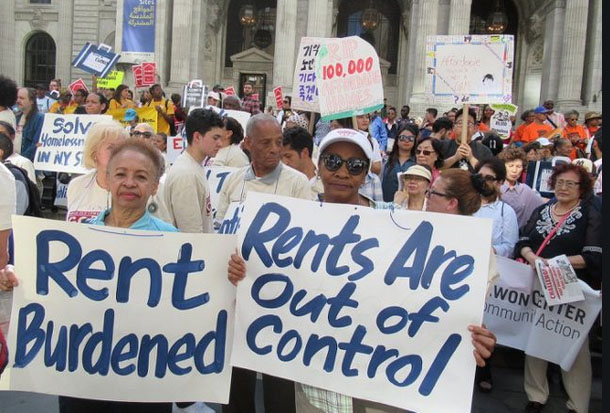Income control supporters say it will protect tenants
by Aracely Martínez
In four years, Estela López has raised an additional $1,100 for renting her apartment in the city of South San Francisco. He currently pays $ 2,800 per month. Estela does not find fair the state measure AB 1482 that will limit the increase in housing income to 5 percent plus the inflation rate, usually between 2 and 3 percent.
“Five percent is too much. They should have left it at a maximum of 3 percent as in San Francisco, ”she says.
Estela, 63, works as a janitor 80 hours a week. “My husband became disabled and can no longer work. I have two jobs. I work 16 hours per day. I can hardly pay the rent, ”she says.
And she says that since the previous owner sold the apartments where she lives, the new owner began to raise and raise the rent excessively. “Two hundred and up to 300 dollars every year,” she says.
She finishes by saying she doesn’t know where the tenants in California are going to go. “At this rate, we will not eat, just work to pay rent,” she laments.
Measure AB 1482 of the San Francisco Democratic Assemblyman, David Chiu, which limits the rise to rents, was approved by the California Legislature and sent to Governor Gavin Newsom for signature.
The governor is expected to sign it without any problem as it is the product of an agreement reached between the landlords and the groups that represent the tenants in the state. He has also been a fierce defender of the measure as a necessary step to bring down gentrification, evictions and the epidemic of people on the streets.
Governor Newsom said about AB 1482, also known as the Tenant Protections Act 2019, that California is on the doorstep to enact strong state-level protections for tenants that are critical to fightthe housing crisis.
“These protections against an escalation of rent and eviction increases will help families keep a roof over their heads and provide important and new tools to combat the accessible housing crisis accessible to California,” said the governor.
Approval of the measure is in the midst of a state crisis of the homeless and the shortage of affordable housing. It will apparently protect 7 million tenants, a coverage that had not been seen in recent US history. Half of the tenants, more than 3 million spend more than 30 percent of their income on rent.
Lila Carrillo, Vice President of Operations and Policies of the Mission Neighborhood Centers, considered AB 1482 a victory. “We are very excited. We have supported this measure because it will prevent rental prices from skyrocketing, and at the same time it will give business owners a chance to make a profit, ”she says.
For a long time, she observes, that they have seen how the Mission neighborhood where their offices are located, have been the focus of the displacement of Latino families due to excessive rent increases.
In the last five, eight and 10 years, about 8,000 families have had to leave their homes in the Mission and move to cities like Pittsburg. “This has affected family stability because their jobs are in San Francisco and they have to drive long distances from work to their home,” she says.
La AB 1482 also prevents homeowners from evicting tenants without citing a reason approved by the government. In most of California, landlords could throw out a tenant without a clear reason. Sometimes just for complaining and demanding repairs.
For Roberto Hernández, organizer of the San Francisco Carnival and accessible housing activist of the Our Mission Not Eviction group, who for years has fought against the evictions of tenants, measure AB 1482 is late.
“They should have approved it 20 years ago. Now, rents are already very expensive. It will benefit those who have incomes of 1,000 dollars because they can no longer increase 1,000 dollars at one time. But what legislators had to do is pass a measure to reduce rents ”he said.
A study on rent control in San Francisco published by the American Economic Review this month found that while rent control prevents the displacement of current tenants in the short term, in the long term, there will be a loss of rental housing on the market, which will ultimately undermine the objectives of the law.
California Business Roundtable President Rob Lapsley said that while they appreciate the hard work done by the authors of the measure and the legislative leaders, AB 14 82 is not a long-term solution to reach the governor’s goal of new housing.
“We need to focus our attention on removing barriers to a new supply of houses since in the first place, that has caused the crisis.”
He added that the constant increase in costly requirements, charges for the construction of local real estate developments and the lack of a reform to the California Environmental Quality Act that regulates environmental standards, have decimated the housing supply in California.
The measure is based on a law that the state of Oregon passed last month to limit rents up to 7 percent plus the inflation rate hike.
Currently 15 cities in California have some form of rent control in their departments, between 1 percent to 4 percent.
AB 1482 does not prevent that when a tenant moves out, the rent of the apartment he left may be increased to the amount the landlord wishes.



